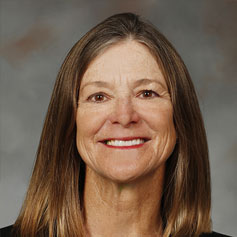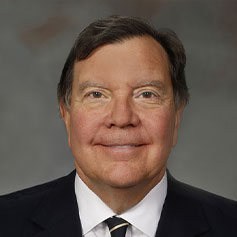Quality of
Governing Body
The extent to which the form and function of the governing body are aligned to long-term value creation.
Board of Directors Profile
| Name | Age | Independent | Director Since | Committee(s) | Principal Occupation | Total Public Company Boards1 |
|---|---|---|---|---|---|---|
| Carolyn H. Byrd2 | Age: 72 | Independent: Y | Director Since: 2010 | Committee(s): Audit (C) | Principal Occupation: Chairman and CEO—GlobalTech Financial, LLC | Total Public Company Boards1: 2 |
| Don DeFosset | Age: 72 | Independent: Y | Director Since: 2005 | Committee(s): CHR (C) NCG |
Principal Occupation: Retired Chairman, President and CEO—Walter Industries, Inc. | Total Public Company Boards1: 4 |
| Samuel A. Di Piazza, Jr.2 | Age: 70 | Independent: Y | Director Since: 2016 | Committee(s): Audit CHR |
Principal Occupation: Retired Global CEO, PricewaterhouseCoopers; Retired Vice Chairman, Citigroup Global Corporate and Investment Bank | Total Public Company Boards1: 4 |
| Zhanna Golodryga | Age: 65 | Independent: Y | Director Since: 2019 | Committee(s): CHR Risk |
Principal Occupation: Chief Digital and Administrative Officer—Phillips 66 | Total Public Company Boards1: 1 |
| John D. Johns3 | Age: 69 | Independent: Y | Director Since: 2011 | Committee(s): Risk (C) | Principal Occupation: Retired Chairman, President and CEO—Protective Life Corp. | Total Public Company Boards1: 3 |
| Ruth Ann Marshall | Age: 66 | Independent: Y | Director Since: 2011 | Committee(s): CHR NCG (C) |
Principal Occupation: Retired President, The Americas—MasterCard International, Inc. | Total Public Company Boards1: 3 |
| Charles D. McCrary | Age: 69 | Independent: Y | Director Since: 2001 | Committee(s): BOARD CHAIR | Principal Occupation: Retired Chairman, President and CEO—Alabama Power Co. | Total Public Company Boards1: 1 |
| James T. Prokopanko | Age: 67 | Independent: Y | Director Since: 2016 | Committee(s): NCG Risk |
Principal Occupation: Retired President and CEO—The Mosaic Co. | Total Public Company Boards1: 3 |
| Lee J. Styslinger III | Age: 60 | Independent: Y | Director Since: 2003 | Committee(s): NCG Risk |
Principal Occupation: Chairman and CEO—Altec, Inc. | Total Public Company Boards1: 3 |
| José S. Suquet2, 3 | Age: 64 | Independent: Y | Director Since: 2017 | Committee(s): Audit Risk |
Principal Occupation: Chairman, President and CEO—Pan-American Life Insurance Group | Total Public Company Boards1: 1 |
| John M. Turner, Jr. | Age: 59 | Independent: N | Director Since: 2018 | Principal Occupation: President and CEO—Regions Financial Corp. and Regions Bank | Total Public Company Boards1: 1 | |
| Timothy Vines2 | Age: 55 | Independent: Y | Director Since: 2018 | Committee(s): Audit CHR |
Principal Occupation: President and CEO—Blue Cross and Blue Shield of Alabama | Total Public Company Boards1: 1 |
- 1. Corporations subject to the registration or reporting requirements of the Securities Exchange Act of 1934, as amended, or registered under the Investment Company Act of 1940.
- 2. Audit Committee Financial Expert
- 3. Risk Management Expert
- (C) Committee Chair
Board Statistics & Highlights
Diversity
42%
by gender, race,
ethnicity, and sexual
orientation
25%
by race/
ethnicity
25%
by gender
92%
independent
9 years
average tenure
66
average age
50%
standing
committees chaired
by diverse Directors
72
Mandatory retirement age
(with rare exceptions in
specific situations)
Directors overboarded under ISS and Glass Lewis Guidelines and market standards:
None
Number of Directors or executive officers permitted to enter into hedging agreements or pledge stock:
None
Engagement with institutional shareholders:
Year-round
Chair of the Board:
Independent
Board Structure
The Board assumes an active role in providing oversight of, and guidance to, our executive management team and in maintaining a strong system of checks and balances. The Board believes that an appropriate Board leadership structure includes a substantial majority of independent Directors with diverse backgrounds and experiences; extremely capable committee chairs; and strong independent leadership provided by either an independent, non-executive Chair of the Board or a Lead Independent Director. The Board’s current leadership structure meets these objectives.
The Board believes that its leadership structure should be flexible to accommodate different approaches based on its evaluation of the best interests of the Company and our stakeholders at any given time. The Board carefully considers its leadership structure and composition each year in consultation with the NCG Committee as part of its continuous succession planning process. A critical aspect of the Board’s leadership structure analysis is determining how best to honor the Board’s commitment to maintaining robust independent leadership, given the present needs of the Company. After undertaking such an evaluation in early 2021, the Board continues to believe that the Company’s interests are best served at this time by having an independent, non-executive Chair to provide independent leadership to the Board, while the Company’s CEO continues to participate in the Board’s activities and operations as a Director.
Our 2021 Proxy Statement includes information about the Board and its standing committees and their respective responsibilities, as well as a Board Skills and Composition Matrix that sets forth, on a Director-by-Director basis, the diversity of expertise and skills that each Director contributes to the Board’s oversight of the Company. This Matrix also discloses, on a Director-by-Director basis, the diverse characteristics each Director brings to the Board. Each year, Directors undergo a robust evaluation process to help ensure each is actively contributing to the Board’s operations and that all necessary skills are present. The evaluation process includes one-on-one discussions between the independent Chair and each independent Director; one-on-one discussions between each committee Chair and their members; full Board and committee evaluations; and follow-up action items, as applicable. This process is further detailed in our 2021 Proxy Statement.
The NCG Committee, which oversees the Board evaluation process, is also responsible for identifying and assessing potential candidates for Directorship using the criteria established by the Board and set forth in the Corporate Governance Principles. Since 2016, the Board has appointed six new Directors. Each of these new Directors has provided unique skills and backgrounds that complement those of the other Directors, thus providing the Board with additional diverse points of view when making decisions and providing oversight. Further, half of the Directors added since 2016 are diverse.
Commitment to Leadership Diversity — The Rooney Rule in Action
In 2019, the NCG Committee and Board amended the Corporate Governance Principles to reaffirm the Board’s commitment to diversity (including gender, race, and ethnicity) by adopting a version of the “Rooney Rule.” Pursuant to the revision, the NCG Committee will endeavor to include candidates who reflect diverse backgrounds in the pool of candidates from which Director nominees are chosen. Similarly, third-party firms used to compile a pool of Director candidates will be requested to include such individuals. This rule was extended to searches for candidates for a Section 16 Executive Officer position, including the CEO’s successor, in 2020. These changes further the existing practice among the Board and executive management of considering diversity when recruiting and nominating individuals for Directorship and Section 16 Executive Officer positions.
Compensation Philosophy and Objectives
Our compensation and benefits programs operate under the guidance and oversight of the CHR Committee. The CHR Committee is responsible to the Board for approving Regions’ executive compensation objectives and ensuring that the compensation programs and policies of the Company support the business goals and strategic plans approved by the Board.
We operate in a highly competitive and regulated environment. Our ability to successfully compete and grow our business depends on the skill, acumen, and motivation of our executives and their ability to develop and execute a dynamic strategic plan. With this in mind, the CHR Committee established the following guiding principles of compensation to serve as the foundation of our compensation philosophy:
- Compensation targets should be transparent and set at competitive levels.
- Actual compensation should pay for performance based on goals that are clear and focused. As an associate’s business responsibilities increase, the mix of compensation should be more heavily weighted toward variable compensation that is considered “at-risk,” based on corporate and individual results.
- Compensation programs should promote shared value through alignment of the long-term interests of our shareholders, customers, and associates.
- Compensation programs should be balanced, incenting sustainable, profitable growth without encouraging associates to take unreasonable risks that may damage the long-term value of the Company. To ensure programs remain consistent with the safety and soundness of the Company, compensation programs should be subject to robust risk management and governance frameworks, including oversight by the CHR Committee of the Board.
- Compensation programs should be fair, equitable, and align with our corporate values.
In addition to these broad guiding principles, the CHR Committee adopted a number of key practices that are consistent with our philosophy and our commitment to excellence in corporate governance. Equally as important as adopting strong practices is a commitment to refrain from certain compensation and employment practices that are inconsistent with our philosophy and goals.
The “Quality of Governing Body” section reflects our Board of Directors as of our 2021 Annual Meeting of Shareholders, held on April 21, 2021.



